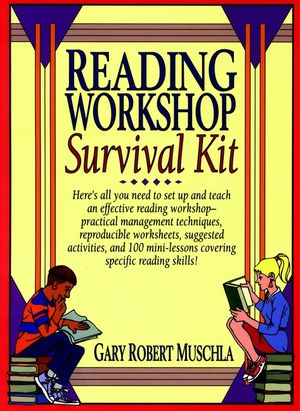Reading Workshop Survival KitISBN: 978-0-87628-592-3
Paperback
336 pages
September 1997, Jossey-Bass
 |
||||||
About reading instruction.
How to use this resource.
PART I: Management of the Reading Workshop.
Chapter 1: An overview of the reading workshop.
Reading in the reading workshop.
Reproducible: "Elements of the Reading Workshop".
Teacher and student roles in the reading workshop.
Reproducibles: "The role of the teacher in the reading workshop".
The value and use of mini-lessons.
A final word.
Chapter 2: Managing the reading workshop.
Building a positive atmosphere.
Setting up your classroom.
Reproducible: "Student responsibilities in the reading workshop".
Reproducible: "Reading Self-appraisal".
Reproducible: "Promoting a positive atmosphere in your reading workshop".
Organizing your day.
Teaching methods in the reading workshop.
Reading logs.
Reproducible: "Reading Log Guidelines".
Reproducible: "Possible questions for reading logs".
Strategies to organize discussion groups.
Incorporating discussion groups in your reading workshop.
Reproducible: "Discussion group guidelines".
A final word.
Chapter 3: Evaluation.
Reading tests.
Daily logs of student performance.
Reading conference.
Portfolios.
Reports, projects, and special activities.
Grades in the reading workshop.
Reproducible: "Book Summary Sheet".
Self-evaluation for teachers.
A final word.
Reproducible: "Self-evaluation question for teachers".
PART II The mini-lessons.
Mini-lesson 1 through 50 Types of reading and related topics.
Fiction and nonfiction.
Short stories, novellas, and novels.
The essay.
Editorials.
General information articles.
Newspaper articles.
Book reviews.
Movie reviews.
Biographies.
Autobiographies.
Genre fiction.
Stories of romance.
Stories of adventure.
Mysteries.
Science fiction.
Fantasy stories.
Horror stories.
Historical novels.
Westerns.
Comedy.
American folklore.
Mythology.
Greek mythology.
Roman mythology.
Norse (Germanic) mythology.
Mythology of Native Americans.
The mythology of Africa.
Mythologies of Asia.
Poetry.
Narrative poems.
Epic poems.
Lyric poems.
Blank verse.
Free verse.
Limericks.
Concrete poetry.
The poetry of Native Americans.
The poetry of African-Americans.
Japanese Poetry-- Free verse, Tanks, and Haiku.
Anthologies, sequels, trilogies, and series.
Pseudonyms-- Why authors use them.
Book titles.
The publishing process.
Film adaptations and novelizations.
Helping students select books for reading.
Building a personal library.
Building good reading habits.
Avoiding poor reading habits.
Reading for different purposes.
Censorship.
Mini-lessons 51 through 76 Story Elements.
Beginnings: prefaces, forewords, prologues, and introductions.
Endings: Epilogues, afterwords, and conclusions.
What makes a good lead?.
Plot.
Theme.
The climax.
Understanding character.
Motivation.
Dialogue.
Conflict.
Setting.
Imagery and figurative language.
Style and tone.
Realism.
Symbolism.
Flashbacks.
Foreshadowing.
Irony.
Satire.
Point of view.
First-person point of view.
Third-person point of view.
Figures of speech.
Idioms.
Alliteration.
Onomatopoeia.
Mini-lessons 77 through 100 Specific Reading Skills.
Comprehension.
Strategies for improving reading comprehension.
The importance of using context cues.
Building a reading vocabulary.
Finding main ideas.
Recalling details.
Making inferences and drawing conclusions.
Identifying fact and opinion.
Cause and effect.
Comparison and contrast.
Using a dictionary.
Using the card catalog.
Reference sources in the library.
Locating information.
Note-taking.
The table of contents.
Using a glossary.
Using an index.
Understanding tables.
Understanding basic graphs.
The SQ3R system.
Reading test-taking strategies.
Readers and the Internet.
Reading for enjoyment.
Suggested reading list.
How to use this resource.
PART I: Management of the Reading Workshop.
Chapter 1: An overview of the reading workshop.
Reading in the reading workshop.
Reproducible: "Elements of the Reading Workshop".
Teacher and student roles in the reading workshop.
Reproducibles: "The role of the teacher in the reading workshop".
The value and use of mini-lessons.
A final word.
Chapter 2: Managing the reading workshop.
Building a positive atmosphere.
Setting up your classroom.
Reproducible: "Student responsibilities in the reading workshop".
Reproducible: "Reading Self-appraisal".
Reproducible: "Promoting a positive atmosphere in your reading workshop".
Organizing your day.
Teaching methods in the reading workshop.
Reading logs.
Reproducible: "Reading Log Guidelines".
Reproducible: "Possible questions for reading logs".
Strategies to organize discussion groups.
Incorporating discussion groups in your reading workshop.
Reproducible: "Discussion group guidelines".
A final word.
Chapter 3: Evaluation.
Reading tests.
Daily logs of student performance.
Reading conference.
Portfolios.
Reports, projects, and special activities.
Grades in the reading workshop.
Reproducible: "Book Summary Sheet".
Self-evaluation for teachers.
A final word.
Reproducible: "Self-evaluation question for teachers".
PART II The mini-lessons.
Mini-lesson 1 through 50 Types of reading and related topics.
Fiction and nonfiction.
Short stories, novellas, and novels.
The essay.
Editorials.
General information articles.
Newspaper articles.
Book reviews.
Movie reviews.
Biographies.
Autobiographies.
Genre fiction.
Stories of romance.
Stories of adventure.
Mysteries.
Science fiction.
Fantasy stories.
Horror stories.
Historical novels.
Westerns.
Comedy.
American folklore.
Mythology.
Greek mythology.
Roman mythology.
Norse (Germanic) mythology.
Mythology of Native Americans.
The mythology of Africa.
Mythologies of Asia.
Poetry.
Narrative poems.
Epic poems.
Lyric poems.
Blank verse.
Free verse.
Limericks.
Concrete poetry.
The poetry of Native Americans.
The poetry of African-Americans.
Japanese Poetry-- Free verse, Tanks, and Haiku.
Anthologies, sequels, trilogies, and series.
Pseudonyms-- Why authors use them.
Book titles.
The publishing process.
Film adaptations and novelizations.
Helping students select books for reading.
Building a personal library.
Building good reading habits.
Avoiding poor reading habits.
Reading for different purposes.
Censorship.
Mini-lessons 51 through 76 Story Elements.
Beginnings: prefaces, forewords, prologues, and introductions.
Endings: Epilogues, afterwords, and conclusions.
What makes a good lead?.
Plot.
Theme.
The climax.
Understanding character.
Motivation.
Dialogue.
Conflict.
Setting.
Imagery and figurative language.
Style and tone.
Realism.
Symbolism.
Flashbacks.
Foreshadowing.
Irony.
Satire.
Point of view.
First-person point of view.
Third-person point of view.
Figures of speech.
Idioms.
Alliteration.
Onomatopoeia.
Mini-lessons 77 through 100 Specific Reading Skills.
Comprehension.
Strategies for improving reading comprehension.
The importance of using context cues.
Building a reading vocabulary.
Finding main ideas.
Recalling details.
Making inferences and drawing conclusions.
Identifying fact and opinion.
Cause and effect.
Comparison and contrast.
Using a dictionary.
Using the card catalog.
Reference sources in the library.
Locating information.
Note-taking.
The table of contents.
Using a glossary.
Using an index.
Understanding tables.
Understanding basic graphs.
The SQ3R system.
Reading test-taking strategies.
Readers and the Internet.
Reading for enjoyment.
Suggested reading list.



